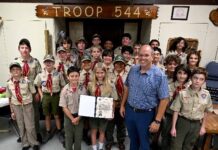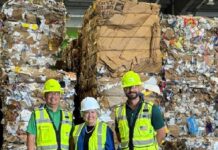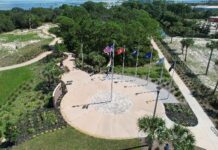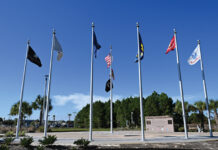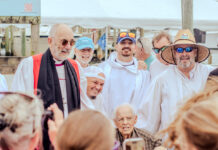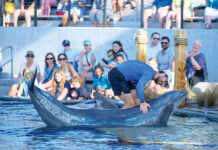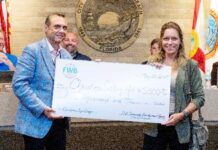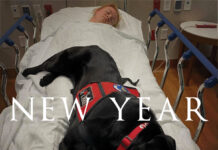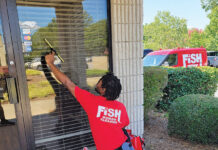By Kelly Murphy-Redd, CEcd
It’s hard to imagine what it’s like to be homeless. We don’t want to imagine it. Most of us probably don’t know any homeless people. But, it can happen to anyone.
The Greater Fort Walton Beach Chamber of Commerce is the only chamber of commerce to run a homeless shelter. One Hopeful Place lives up to its name. It provides hope for many who have fallen on hard times and need a hand up, not a handout.
 Walter Arrington is a “graduate” of One Hopeful Place.
Walter Arrington is a “graduate” of One Hopeful Place.
At 26 years old, Walter came out of the Marine Corps with hidden wounds. He then had back surgery. He spiraled downward very quickly. He divorced his wife and gained custody of his son. He couldn’t stop drinking and one day he called his ex-wife and told her to come to get their son.
Walter lived in an apartment in Niceville, worked at Dockside, and attended classes at Northwest Florida State College. He lost his job, stopped going to class and got behind on his rent. He slipped out of his apartment before he could be evicted and lived in his car before it broke down.
Okaloosa Island beach parks offered a nighttime refuge. He would use the public bathroom and shower wearing a bathing suit and carrying his bottle of shampoo. A friend’s couch would sometimes be a bed for the night. Walking everywhere or riding a bike, he got to know where to find a place to stay. A night’s lodging might be an abandoned commercial building or a tarp strung up on a wooded lot. He could camp a short distance from the day labor location. Walking around and getting to know the other homeless people helped Walter get the lay of the land. It always helped to bring a bottle.
Shame was the overriding emotion during this time. Walter’s mother, who has a Doctorate in Nursing Science wrote her doctoral thesis on healthcare for the homeless. She would take him to lunch or buy him a pair of pants, but would not enable his alcohol addiction and resulting homelessness. He had to hit rock bottom where the pain of continuing this existence was more painful than making the decision to change his life. Walter says he had forgotten how to live. The homeless are so busy trying to meet basic needs.
A Pensacola program didn’t work out and Walter tried One Hopeful Place. He came and went a few times. Building relationships is the first order of business for One Hopeful Place after providing someone with shelter, food, water and safety. They offer services when asked. Then they will find the specific services needed for each individual case. The person can cycle in and out. There are three rules: 1. Respect your fellow. 2. No drugs or alcohol. 3. No violence. This is called the low-barrier model. People who come to a shelter have trouble with trust.
When Walter was ready to make a change and ask for help, a community member would pick him up and take him to a 12-step program. He was encouraged to get treatment. The staff helped make a plan to get treatment, come back and transition into a sober living environment.
After hurting his back again, Walter received Worker’s Comp benefits. A mentor convinced him to go back to school to finish his Associate’s Degree in general studies. He obtained scholarships and earned a Bachelor’s Degree in Social Work from UWF in 2022. An internship with the Alfred Washburn Center in Pensacola was a pivotal step in his career path. The Director, Michael Kimberl became a dear friend and taught Walter how to interact with the homeless population. He learned you have to see, acknowledge and listen before you can offer services.
In late 2020, a homeless encampment appeared under I-110 in Pensacola near Cervantes. Michael Kimberl asked Walter if he would volunteer to help manage the camp. The city wanted to allow for a period of time to offer services and shelter to those willing to accept the help. Around the same time, the Homelessness Task Force Florida was created. Walter joined the committee that eventually became the Substance Abuse and Case Management Committee. The goal was to get medical services to the homeless. Walter’s position came out of the committee. His mission was to get the mobile medical unit up and running. The unit is a 40-foot U-Haul truck with two exam rooms, a wheelchair lift, and air conditioning. The unit is deployed each week to encampments with a Nurse Practitioner or Physician’s Assistant and nurse. He currently serves as the Unhoused Care Navigator for Community Health Northwest Florida.
Walter talks a lot about the Spain and Portugal model of helping the homeless. He says there must be accountability and consequences for bad behavior. The United States is not embracing the accountability part of the equation.
Sixty percent of the homeless are on Social Security or disability. The “big three” reasons for homelessness are mental health issues, substance abuse, and medical issues. The longer someone is homeless the worse the mental health issues become. In a shelter, a person is allowed to decompress and meet the basic needs of shelter, food, water, and safety.
Sometimes the victories are preventing overdoses or death. Other times the victories are people getting sober, medical help, jobs, and independent living – getting their lives back.
Walter is so grateful for the help he received from One Hopeful Place, Michael Kimberl, and others and wants to pay it forward. There can be failure after failure but there can also be transformation and success. He likes the harder cases that others have given up on. The hard ones have the most potential.
Walter receives his Master’s Degree in Social Work from UWF on May 6th of this year. He will also be giving the commencement speech. His mother is very proud of her son.


